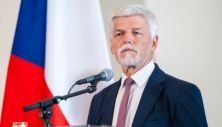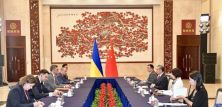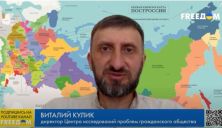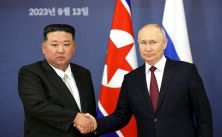On the eve of the Global Peace Summit and the anniversary 75th NATO summit, Russia began to use nuclear blackmail with renewed vigor. This suggests that the Kremlin has stepped up a campaign of reflexive control aimed at Western decision-making using nuclear threats and diplomatic manipulation. And China helps him a lot in this. This opinion was voiced by political strategist Boris Tizengauzen on the FREEDOM TV channel.
“Russia is again using nuclear blackmail to intimidate the world community. First, it announced a surprise inspection of tactical nuclear weapons, synchronized with Belarus. In addition, Russian officials said that the F-16 fighters that will be delivered to Ukraine will be considered as potential carriers of nuclear weapons, regardless of modification. All these threats were made just on the eve of the Global Peace Summit, which is scheduled to take place on June 15-16 in Switzerland, as well as on the eve of the anniversary 75th NATO summit. All these statements, by the way, worked well for the European public,” the political strategist noted.
According to him, it is worth looking at the headlines of key publications in Europe. Some of them write on the front page that for the first time since the collapse of the Soviet Union, Russia has launched exercises on the use of tactical nuclear weapons. By the way, such threats from the Russian Federation also work against some European leaders.
“Let’s remember the end of 2022, when, after yet another nuclear threat from the Russian Federation, German Chancellor Olaf Scholz went to China to negotiate with Xi Jinping so that the PRC would officially make a statement about the impossibility of using China’s nuclear weapons. The Chinese leader did even more – he stated not only that these weapons cannot be used, but that they cannot be threatened with these weapons either. And it seems to me that Putin and Xi Jinping are now playing the “good cop-bad cop” game. That is, Xi Jinping supports the Russian narrative that the Russian Federation can really use nuclear weapons. And thus, on the fear of other world leaders, he bargains for himself and Russia for some preferences,” Tizengauzen noted.
The political strategist added that China views Russia’s war against Ukraine as one of the instruments of influence on its key enemy, the United States of America.
“Relatively speaking, Xi Jinping is “selling” influence on Putin. For example, he restrains Putin from pressing the nuclear button. But in exchange for some of their own conditions. His latest trip to Europe, in particular to France, suggests that the Chinese leader has sold his role as chief negotiator with Putin to French President Macron. Some indicators indicate this – the sending of the French ambassador to the so-called inauguration of Putin. That is, this suggests that Macron has taken a small step towards meeting Putin. Some kind of concession was received from Macron. But we can find out which one later,” explained the political strategist.
He also added that China, which everywhere declares that it is not a party to the conflict in the Russian Federation’s war against Ukraine, today is in fact one of the key economic partners of the Russian Federation, supporting it financially in the war against Ukraine.
“China is the only, practically key savior of the Russian economy in 2022. If China had not lent a shoulder then, everything would have been much worse for the Russian Federation. Especially against the backdrop of the fact that Ukraine managed to liberate the Kharkiv region and part of the Kherson region. Therefore, China’s role in supporting Russia cannot be downplayed. Now he finds himself in a rather advantageous position – he makes money from the Russian Federation and gets bonuses for himself in Europe, using his personal relationship with Putin and the Europeans’ fear of Russia’s nuclear threats,” summarized Boris Tizenhausen.













